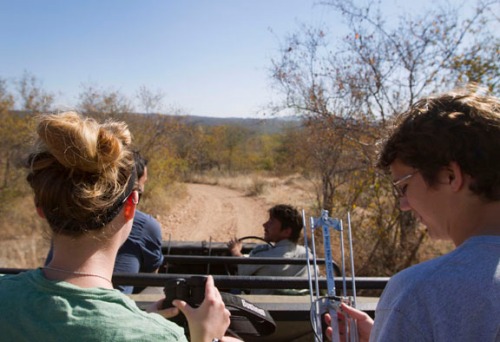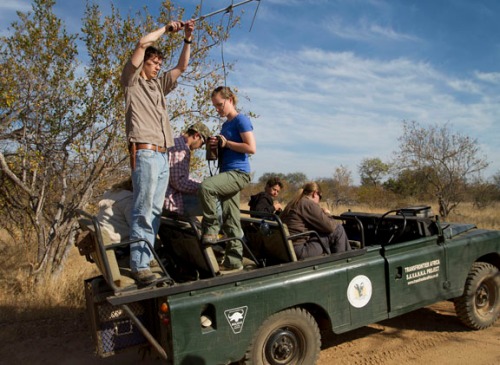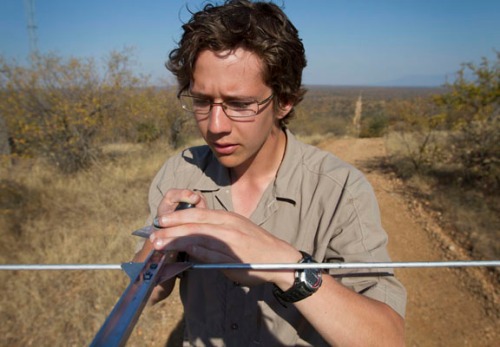Biology
WKU students conducting research on black rhinos in South Africa
- Friday, June 29th, 2012
WKU biology students John Clark, a Bowling Green senior, and Rachel Beyke, an Indianapolis junior, are conducting research on black rhinos in South Africa for their Honors Capstone Experience/Thesis projects. Clark is creating an index of the vegetation rhinos prefer to eat and Beyke is exploring the effect humans have on where rhinos choose to roam. (Photos courtesy of WKU photojournalism student Sam Oldenburg)
 Above: During their first day of field work, Clark (right) and Beyke ride in a Land Rover through Olifants West Nature Reserve, an associated private nature reserve bordering Kruger National Park in South Africa.
Above: During their first day of field work, Clark (right) and Beyke ride in a Land Rover through Olifants West Nature Reserve, an associated private nature reserve bordering Kruger National Park in South Africa. Above: While looking for black rhinos in the Olifants West Nature Reserve in South Africa, Clark (left) and Beyke search for radio signals emitted by collars worn by the rhinos.
Above: While looking for black rhinos in the Olifants West Nature Reserve in South Africa, Clark (left) and Beyke search for radio signals emitted by collars worn by the rhinos.
 Above: Clark uses a compass to read the angle from which he heard a radio signal emitted by a collar worn by a black rhino in the Olifants West Nature Reserve. Using angles gathered from three different points, Clark triangulates the location of rhinos. His research will create an index of the vegetation rhinos prefer to eat.
Above: Clark uses a compass to read the angle from which he heard a radio signal emitted by a collar worn by a black rhino in the Olifants West Nature Reserve. Using angles gathered from three different points, Clark triangulates the location of rhinos. His research will create an index of the vegetation rhinos prefer to eat.
 Above: Clark inspects hippo damage in a corn field near the Blyde River in Limpopo province of South Africa. In addition to working on his own Honors Capstone Experience/Thesis project, Clark is assisting graduate student Molly Duvall with her thesis. Duvall’s research aims to decrease human-animal conflict through the use of scarecrows that release smells and sounds of predators.
Above: Clark inspects hippo damage in a corn field near the Blyde River in Limpopo province of South Africa. In addition to working on his own Honors Capstone Experience/Thesis project, Clark is assisting graduate student Molly Duvall with her thesis. Duvall’s research aims to decrease human-animal conflict through the use of scarecrows that release smells and sounds of predators.
Some of the links on this page may require additional software to view.

